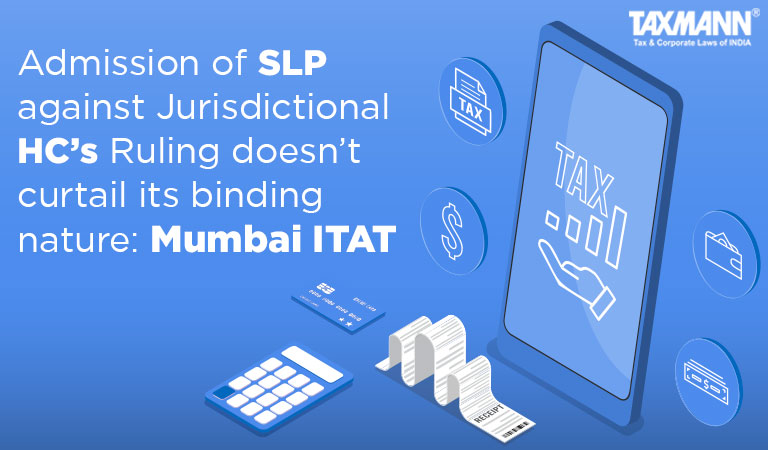Admission of SLP against Jurisdictional HC’s Ruling doesn’t curtail its binding nature: Mumbai ITAT
- Blog|News|Income Tax|
- 2 Min Read
- By Taxmann
- |
- Last Updated on 7 November, 2022

Case Details: Luxora Infrastructure (P.) Ltd. v. DCIT - [2022] 144 taxmann.com 93 (Mumbai-Trib.)
Judiciary and Counsel Details
-
- Pramod Kumar, Vice-President & Pavan Kumar Gadale, Judicial Member
- K.P. Dewani for the Appellant.
- Shailja Rai for the Respondent.
Facts of the Case
Assessee-company was engaged in the business of construction and development of townships. Due to search operations carried out on the assessee and its associated group, assessee was called upon to file a fresh return under section 153A.
During the assessment, Assessing Officer (AO) made additions under section 68 with respect to the amount received from two entities. The assessee carried the matter in appeal before the CIT(A) but without success. The matter was reached before the Mumbai Tribunal.
The assessee contended before the Tribunal that the issue under appeal was squarely covered by the judgement of the Hon’ble jurisdictional High Court, in favour of the assessee. However, AO didn’t consider it by stating that said ruling is in appeal before the Hon’ble Apex court.
ITAT Held
The Mumbai Tribunal held that the decision of a High Court is binding only in the state of jurisdiction and not for a non-jurisdictional state. Although, it can have a persuasive effect.
The Tribunal clarified that the mere pendency of the appeal against the binding jurisdictional judgement to a higher judicial forum does not curtail, dilute or narrow down its binding nature. Also, unless such judicial precedent is reversed or upturned by a higher form, it is binding upon the lower judicial forums.
Thus, the plea of the assessee was accepted and additions made under section 68 were to be deleted following the judgement of the Hon’ble jurisdictional High Court.
Disclaimer: The content/information published on the website is only for general information of the user and shall not be construed as legal advice. While the Taxmann has exercised reasonable efforts to ensure the veracity of information/content published, Taxmann shall be under no liability in any manner whatsoever for incorrect information, if any.

Taxmann Publications has a dedicated in-house Research & Editorial Team. This team consists of a team of Chartered Accountants, Company Secretaries, and Lawyers. This team works under the guidance and supervision of editor-in-chief Mr Rakesh Bhargava.
The Research and Editorial Team is responsible for developing reliable and accurate content for the readers. The team follows the six-sigma approach to achieve the benchmark of zero error in its publications and research platforms. The team ensures that the following publication guidelines are thoroughly followed while developing the content:
- The statutory material is obtained only from the authorized and reliable sources
- All the latest developments in the judicial and legislative fields are covered
- Prepare the analytical write-ups on current, controversial, and important issues to help the readers to understand the concept and its implications
- Every content published by Taxmann is complete, accurate and lucid
- All evidence-based statements are supported with proper reference to Section, Circular No., Notification No. or citations
- The golden rules of grammar, style and consistency are thoroughly followed
- Font and size that’s easy to read and remain consistent across all imprint and digital publications are applied



 CA | CS | CMA
CA | CS | CMA
